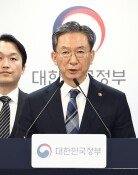Next Years Budget to be 131 Trillion Won
Next Years Budget to be 131 Trillion Won
Posted September. 10, 2004 21:39,
The government and the Uri Party drew up a 131.5 trillion-won budget bill for next years expenditure (based on general accounts) on Friday, a 9.5 percent jump from this year.
This figure is increased by 11.4 trillion won from this years 120.1 trillion-won budget, and the government has decided on issuing deficit-covering bonds worth 6.8 trillion won next year.
The Ministry of Planning and Budget (MPB) had appropriated some three trillion won for next years deficit-covering bonds in the beginning, but during the course of the party-government consultative conference, the amount to be issued increased more than twofold with the Uri Party pushing for a tax cut policy (2.5 trillion won drop in revenue) and a strong policy to enlarge financial support (additional fiscal expenditure of 1.3 trillion won).
As for the issuing amount of deficit-covering bonds, it is the highest since the issuance of 10.4 trillion won in 1999 right after the financial crisis.
Uri Party floor leader Chun Jung-bae, chief policymaker Hong Jae-hyong, and MPB Minister Kim Byung-il held a party-government meeting that day at the National Assembly and agreed to the 2005 budget bill including the above details.
The budget scale increased by 1.5 trillion won from the original 130 trillion won that the MPB had set for next year during the party-government conference.
Uri Partys chief policymaker Hong said at the briefing, We have decided on the 1.5 trillion won increase from the original budget plan to center on expanding growth potential and the innovation base for small- and mid-sized enterprises along with supporting the alienated class.
Besides next years 1.5 trillion won increase in the budget for the projects the Uri Party is focusing on, the government agreed to support additional funds, altogether totaling 2.5 trillion won, mobilizing next years reserve fund. Also, a separate 1.2 trillion won was apportioned in the fund business area to support the partys centered projects.
Section by section, increases of 230 billion won for investing in research and development, 300 billion won for financing local education and reforming university structure, and 210 billion won for supporting childcare and early childhood education were drawn up from the original budget bill.
Also allotted were an extra 640 billion won to strengthen the competitiveness of the industry and small- and mid-sized enterprises and 470 billion won to invest in social overhead capital (SOC). There was a 260 billion won increment for the foreign affairs and unification department including the Inter-Korea Cooperation Fund, 210 billion won to support farming and fishing towns, and 200 billion won for the social welfare and environmental field.
Young-Hae Choi yhchoi65@donga.com







